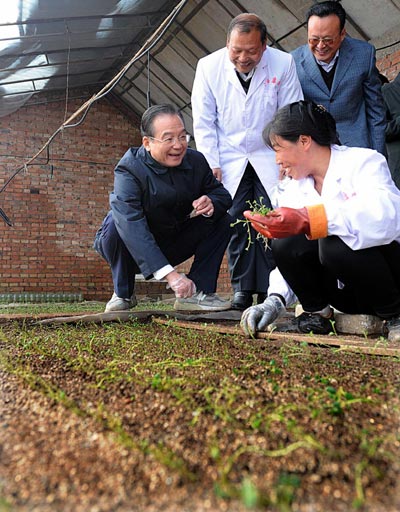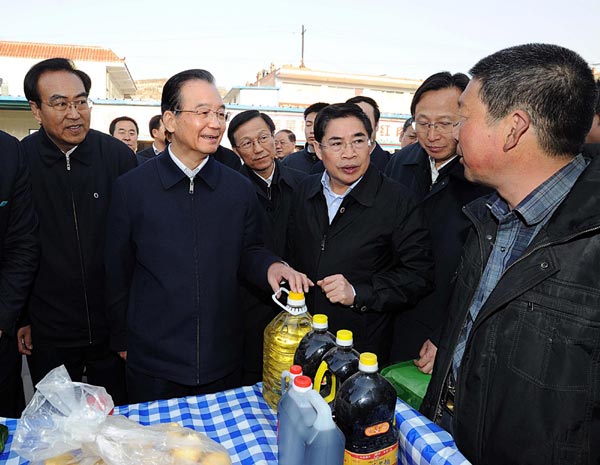Government and Policy
Premier Wen: Farmers' rights a priority
By Cang Wei (China Daily)
Updated: 2011-04-05 07:47
 |
Large Medium Small |
BEIJING - Premier Wen Jiabao on Monday said regional authorities must protect farmers' rights and warned that no land should ever be taken "against a farmer's will".
Wen, who was rounding off a three-day visit to the impoverished Luliang, Shanxi province, told residents their land is a "fundamental social security" and that any transfer in use should first be agreed with the farmer.
 |
|
Premier Wen Jiabao talks with a worker at a potato seedling farm operated by the Kangnong Potato Co Ltd in Luliang, Shanxi province, on Saturday. The premier was making a three-day visit to the mountainous region. [Photo / Xinhua] |
"Even if the land is to be used for roads or houses, no one can take a farmer's land against their will," he said.
The premier urged governments and farmers to improve irrigation facilities to ensure better and more stable harvests, while officials were told to work hard to eliminate poverty in the mountainous region.
| ||||
As China has continued on its path of urbanization, the task of transforming farmers into urban residents while protecting their legal land rights has proved a challenge. The 2008 reform is aimed at encouraging villagers to relocate to new buildings so their land can be used for agricultural or industrial use. However, the system has been abused, with some reluctant farmers forced to move.
"There is a gray area in the regulations on using land for public welfare, which makes the misuse of farmers' land by local governments legal," said Cai Jiming, director of Tsinghua University's political economy research center.
After three decades of urban development, in which roughly 20 million hectares of land has been swallowed up, China also now faces a shortage of farmland, said Cai.
Regulations used to state at least 140 million hectares of farmland was to be preserved to guarantee grain output, yet that was adjusted to 120 million due to the aggressive use of land by industries and urbanization.
"Many local governments have already made land plans up until 2020," Cai added. "If this trend continues, the red line of 120 million hectares will soon be crossed."
Several pilot cities, including Chengdu in Sichuan province and Chongqing, are attempting to integrate urban and rural areas, with relocated farmers offered jobs at nearby factories.
"Farmers' rights are protected well in these pilot cities ... but we hope that more breakthroughs can be made," said Cai.
Jiang Qianfan, a professor of constitutional law at Peking University, agreed and urged the central authorities to "tighten supervision, as some local governments neglect the regulations".
 |
|
Premier Wen Jiabao talks with a worker at a market in Linxian county of Luliang, Shanxi province, April 2, 2011. [Photo/Xinhua] |



